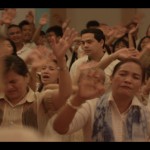One of the more painful moments in a film that is filled with heartbreak comes when a man, molested by a priest as a child and ignored by his denomination, goes to a cabin to confront the man who raped him. Although the priest admits, in a chillingly off-handed matter, that he did it (it was a long time ago, he is sorry), his housekeeper chastises the victim.
“Are you a Catholic?”
During a Q&A at the Toronto International Film Festival, Alex Gibney opined that the inference behind that exchange–she continually asking if he is a Catholic, he insisting that he is talking about molestation not religion–is that she is telling the man he should “take one for the team.”
As hard as it is to believe that such attitudes towards the victims exist, it is harder still to come to any other conclusion. When asked what revelations surprised him the most in making the film, Gibney stated “the repetition of patterns from place to place” which led him the “ineluctable conclusion” that (echoing one of his participants) what some might fear was a “conspiracy” was actually something worse, “a policy.”
Was it a policy to focus on the reputation of the church over and above the spiritual needs of the victims? In an interview with Patrick J. Wall (who was described as a “fixer” for the Roman Catholic church) it is revealed that Wall had authorization to settle cases regarding sexual abuse for up to $250,000 provided there was a strict confidentiality agreement. In 1975, there was a budget of seven million dollars set aside for settlements. In a section about the Order of the Paraclete, a department designed to “rehabilitate” sex offenders, it is stated that between the 50s and 90s, approximately 2,000 priests were treated by the Order of the Paraclete.
These are hardly statistics that would indicate isolated problems that were only revealed to church leadership years later. Richard Sipe, a sociologist and former Benedictine Monk is interviewed and states that his research indicated that approximately 50% of priests are celibate, creating a culture where this vow and requirement is not taken seriously. (Note: he does not claim that all of the sexually active priests are pedophiles.)
Gibney, who told the audience in Toronto that he “believe[s] in God” but “not in religion,” was born into a Roman Catholic family but has had little interaction with the church. His goal was not to make a “survey” film but a “crime film.” He said, “I wanted to follow one story to the top.” He also stated that he was sympathetic to attempts by lawyers of the victims of child molestation to get the Vatican to open its archives to some sort of human rights group in order to air the truth of what was known and when. Comparing such a procedure to the Truth and Reconciliation Commission in South Africa, he noted that such groups aren’t always and only about punishing the guilty so much as recognizing that healing is nearly impossible when the truth remains concealed for their benefit.
It is hard to imagine being a child or young adult and being subjected to repeated abuse from someone you trust. It is harder still to imagine the devastating effect of finally marshaling the courage to tell an adult and realizing that they can (or will) do nothing to stop it. By its very subject matter, Mea Maxima Culpa is a film that will bring criticism to Gibney from some quarters. In my mind, it is not just about silence as a response, it is about attempts to silence, which is, if possible, even more hideous. Gibney’s film gives voices to those who have for so long been robbed of their own and for that, I say God bless him.
Update: This film will be available on 10/8/2013 on DVD from Cinedigm.













